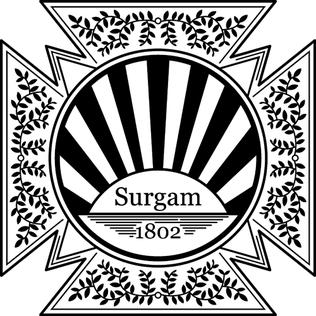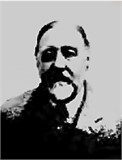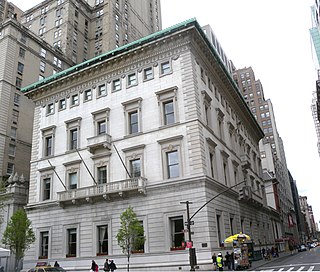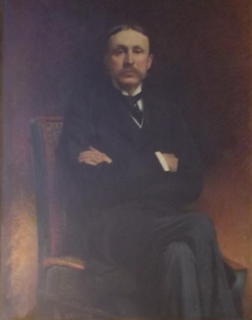Related Research Articles

Columbia University is a private Ivy League research university in New York City. Established in 1754 as King's College on the grounds of Trinity Church in Manhattan, Columbia is the oldest institution of higher education in New York and the fifth-oldest institution of higher learning in the United States and is considered one of the most prestigious schools in the world. It is one of nine colonial colleges founded prior to the Declaration of Independence, seven of which belong to the Ivy League. Columbia is ranked among the top universities in the world.

William Backhouse Astor Sr. was an American business magnate who inherited most of his father John Jacob Astor's fortune. He worked as a partner in his father's successful export business. His massive investment in Manhattan real estate enabled major donations to the Astor Library in the East Village, which became the New York Public Library.
The Philomathean Society of the University of Pennsylvania is a collegiate literary society, the oldest student group at the university, and a claimant to the title of the oldest continuously-existing literary society in the United States. Founded in 1813, its goal is "to promote the learning of its members and to increase the academic prestige of the University." Philomathean is derived from the Greek philomath, which means "a lover of learning." The motto of the Philomathean Society is Sic itur ad astra.

The Philolexian Society of Columbia University is one of the oldest college literary and debate societies in the United States, and the oldest student group at Columbia. Founded in 1802, the Society aims to "improve its members in Oratory, Composition and Forensic Discussion." The name Philolexia is Greek for "love of discourse," and the society's motto is the Latin word Surgam, meaning "I shall rise." The society traces its roots to a literary society founded by Alexander Hamilton in the 1770s.

James Roosevelt "Rosy" Roosevelt was an American diplomat, heir, and the older half-brother of Franklin Delano Roosevelt, the 32nd president of the United States.

Elbridge Thomas Gerry, usually called "Commodore" Gerry due to the office he held with the New York Yacht Club from 1886 to 1892, was an American lawyer and reformer who was the grandson of U.S. Vice President Elbridge Gerry.

Abraham Schermerhorn was a wealthy New York City merchant who was also prominent in social affairs. He was the father of Caroline Schermerhorn Astor, known as the Mrs. Astor.

The Livingston family of New York is a prominent family that migrated from Scotland to the Dutch Republic, and then to the Province of New York in the 17th century. Descended from the 4th Lord Livingston, its members included signers of the United States Declaration of Independence and the United States Constitution. Several members were Lords of Livingston Manor and Clermont Manor, located along the Hudson River in 18th-century eastern New York. The other two most influential New York dynasties of the 18th and 19th centuries were the Schuyler family and the Clinton family.

Theodore Douglas Robinson was an American politician from New York who served as the Assistant Secretary of the Navy from November 1924 to 1929. He was a member of the Roosevelt family through his mother and was the eldest nephew of President Theodore "T.R." Roosevelt, Jr. (1858–1919). As an Oyster Bay Roosevelt, Theodore was a descendant of the Schuyler family.

The Metropolitan Club of New York is a private social club on the Upper East Side of Manhattan in New York City. It was founded as a gentlemen's club in 1891 for men only, but it now allows women into membership.

The Saint Nicholas Society of the City of New York is a charitable organization in New York City of men who are descended from early inhabitants of the State of New York. Charles R. Mackenzie, Esq. is the current president. The organization preserves historical and genealogical records of English-ruled New York and Dutch-ruled New Amsterdam. The society has helped preserve the oldest historically landmarked buildings in New York City. The Society is financing the digitization of its colonial historical archives to be made publicly available at the New-York Historical Society.

William Backhouse Astor Jr. was an American businessman, racehorse owner/breeder, and yachtsman who was a member of the prominent Astor family. His elder brother, financier and philanthropist John Jacob Astor III, became head of the British line of Astors in England. William Jr. was head of the American line of Astors, while his wife, Caroline Schermerhorn, served as the leader of New York society's "Four Hundred" during the Gilded Age.

Ogden Goelet was an American heir, businessman and yachtsman from New York City during the Gilded Age. With his wife, he built Ochre Court in Newport, Rhode Island, his son built Glenmere mansion, and his daughter, Mary Goelet, married Henry Innes-Ker, 8th Duke of Roxburghe.

George Goelet Kip was a New York lawyer, heir and member of the Goelet family during the Gilded Age.

Thomas Russell Gerry was an American sailor who was active in the Sons of the American Revolution and was a son of the fifth U.S. Vice President Elbridge Gerry.
Marshall Orme Wilson Jr. was an American diplomat and member of the Astor family.

Charles Suydam Cutting, CBE was an explorer, naturalist, society figure, philanthropist, and author. He travelled around the world on numerous expeditions including the Field Museum-Chicago Daily News Abyssinian, Kelley-Roosevelts Asiatic, and Vernay-Cutting Expeditions. He was among the first Europeans to enter the forbidden city of Lhasa in Tibet and is credited with introducing the Lhasa Apso breed into the United States.

William Montgomery Vermilye was an American banker and philanthropist.
Peter P. Goelet, was an American merchant and real estate investor.
References
- ↑ The Undergraduate Record: Columbia College. A Book of Statistical Information. Gillis Bros. 1881.
